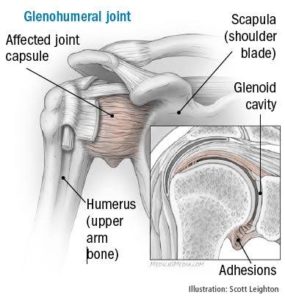Frozen Shoulder/ Adhesive Capsulitis
Frozen shoulder or Adhesive capsulitis is a debilitating condition that occurs without reason or provocation. Frozen Shoulder begins with dull achy pain and stiffness in the shoulder joint and could cause pain down the back, side and front of the upper limb. It occurs most commonly in the 40 to 60 year old age group and occurs more frequently in women than men. The symptoms typically worsen after movement of the arm and at night when in bed.
The shoulder consists of the humerus (upper arm), the scapula (shoulder blade) and the clavicle (collarbone). The shallow socket of the humeroscapular connection leaves the shoulder being a relatively unstable joint and therefore the joint capsule which surrounds the entire joint is relatively strong connective tissue and is called the shoulder capsule. Synovial fluid located within the joint adds lubrication to the joint.
In Frozen Shoulder the shoulder capsule becomes stiff and tight and results in thickening of the tissues called adhesions, forming within the connective tissue of the shoulder. The joint loses some of its synovial fluid as well and this results in decreased lubrication within the joint. The shoulder loses mobility in regards to range of motion in both active and passive movement. There is a definitive period to Adhesive capsulitis. Stage 1 is the Freezing Stage; stage 2 is Frozen and Stage 3 Recovery/ Thawing.
Stage 1 Freezing.
This stage last approximately 4-8 months in which the pain can increase and the stiffness causes a gradual decrease in movements of the shoulder in all ranges of movement.
Stage 2 Frozen.
During this stage pain may decrease however the decrease in the range of movement remains. This may make daily activities very difficult and could last up to 8 months.
Stage 3 Recovery or Thawing stage
This stage can take anywhere up to 2 years to recover to full or almost full range of movement and strength. Recovery is gradual and pain decreases accordingly.
The causes of Adhesive Capsulitis are not well known however Primary Adhesive Capsulitis is characterized by an idiopathic onset while Secondary Adhesive Capsulitis there are increased risk factors from diseases such as Diabetes Mellitus, hypothyroidism and hyperthyroidism, Parkinsons and cardiac disease. There is a little evidence to suggest the risk of Adhesive Capsulitis increases after immobilization of the shoulder or shoulder injury or fracture.
Treatment of this debilitating condition is to try to decrease the loss of range of movement and to decrease the pain using a variety of soft tissue techniques. Both Physios and Osteopaths may facilitate in using passive treatment to increase range and decrease pain. Dry needling may also be used to acquiesce these outcomes.
